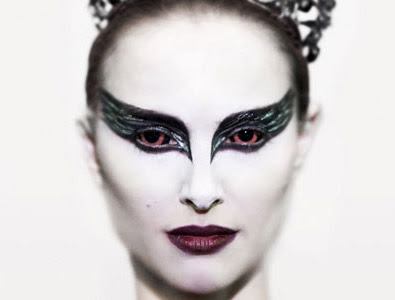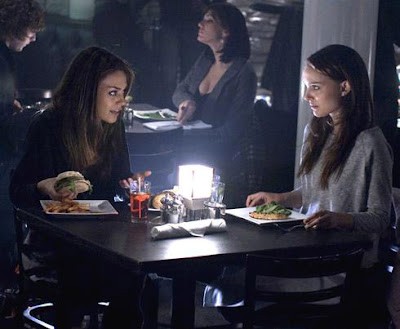Darren Aronofsky is undoubtedly one of the boldest filmmakers working today. Black Swan is intended as a companion piece to his previous film The Wrestler - in fact, both were initially conceived as one movie - and though the shot selections may look similar, the meaning derived from them is diametrically opposite. Slowly building to hysteria, this movie ratchets up the intensity until its climactic conclusion, leaving the audience breathless and stunned at the incredible finale.
Black Swan
Director: Darren Aronofsky
Starring: Natalie Portman, Vincent Cassel, Mila Kunis, Barbara Hershey
Nina Sayers (Portman) is a ballerina on the rise, replacing Beth (Winona Ryder) as the lead dancer in a new production of Swan Lake from ballet impresario Thomas Leroy (Vincent Cassel). While her form is excellent due to years of training with her ex-ballerina mother Erica (Barbara Hershey), Nina lacks the passion required for the duality of the Swan Queen; new addition Lily (Mila Kunis) has the sensuality necessary for the darker side of the role and the two dancers traverse a psychological battlefield on the road to the opening night performance.
Let's get this out of the way: Natalie Portman clearly deserves an Oscar nomination (and probably a win - I haven't seen every movie this year, so it's hard to say for sure) for her work as Nina. Pure and simple, she loses herself in the role and delivers one of those special performances people will be talking about for years. Again, like The Wrestler before it, this is an intensely personal movie that hinges on the performance of its lead, and Portman gamely raises her commitment to a level previously unseen from the young actress.
While Natalie has been earning rave reviews the world over, I don't think enough attention is being paid to the supporting cast. Barbara Hershey is great as the overprotective mother living vicariously through her daughter's success, and Vincent Cassel shines as the ballet director and choreographer, taking his cues from Anton Walbrook's Boris Larmontov in The Red Shoes. Mila Kunis truly stands out with her most impressive work to date; Lily's sensuality perfectly complements the repressed and subdued Nina and the competition between the two turns fierce.
I won't pretend to have seen The Red Shoes or Suspiria any earlier than last week or for any other reason than in preparation for Black Swan, but I'm certainly glad I watched those movies. While not required viewing, they lay the groundwork for another level of appreciation of Aronofsky's latest, and their influence, both in style and story, is clearly on display in Black Swan. Stylistically, the film leans more toward Argento's Suspiria, a visually striking film about a ballerina who discovers her academy is run by a coven of witches. But the story - especially the "story-within-a-story" elements - seem to be directly influenced by The Red Shoes, a movie about a young upstart ballerina taking on the lead in a new ballet inspired by a fairy tale.
Matthew Libatique, who has worked with Aronofsky on all of his previous films, returns as the cinematographer. Libatique's camera sways closely across the stage with the dancers acting almost as a dance partner itself, providing a unique experience for the audience and an intimacy with the characters that a stationary camera could not achieve. The iconic "following" shots from The Wrestler are repeated here, but with a totally different meaning: with the camera at the back of Randy "The Ram" Robinson, a sense of history and Mickey Rourke's broken-down physique led us to believe this was a man on his way out, the camera serving almost as a reminder of times long past. Here, the camera lingers behind Nina - a dancer in peak physical condition - and her quick pace highlights her determination and desire for perfection, the camera very nearly manifesting itself into her drive as a performer.
The opening scene was stunning, a long continuous shot of Nina dancing with the black-feathered evil sorcerer from Swan Lake, accented only by a single spotlight. There are also a few neat tricks involving mirrors, most of which take place directly behind a character but hide the camera from view (aided, of course, by post-production work). A nightclub scene illuminated by strobe lights and drenched in red and green provided another callback to the color palette used in Suspiria, but the fractured images and rapid editing here complimented this section of the story, in which Nina is on a drug fueled binge before her big performance.
Clint Mansell, also a frequent Aronofsky collaborator, provides the musical score and turns out another phenomenal piece of work. Inspired by the music in Swan Lake, Mansell infuses classical compositions with his patented dynamism and composes songs that highlight the operatic feel of the movie. Mimicking the dichotomy that runs through the movie, Mansell's score feels like the music to an actual ballet but somehow manages to simultaneously feel like a film score. Tough to put into words, but you'll know it when you hear it. It's a strange mixture, but one that works incredibly well and serves to heighten the drama of the story and the intensity of the movie's increasingly insane visuals.
And oh, do those visuals get insane. The movie has hints of weirdness peppered through the first hour - an unexplained rash here, a mirror flash there - but at a certain point, the bottom drops out and we're treated to near Lynchian levels of craziness. I don't want to ruin any of these moments for you - that's half the entertainment value of the movie - but suffice it to say Aronofsky holds nothing back, and the second half of the movie chronicles a descent into madness that will have you questioning everything you've seen thus far. There's a horror vibe that comes in near the end, unabashedly playing up the "psychological" part of the film's "psychological thriller" genre.
There is so much going on in this movie that I feel like I need another viewing to fully comprehend all of it. Aronofsky refuses to be content with a simple All About Eve-inspired tale of competition between athletes; he soaks the movie with complex sexual messages (using sex as an aid to artist's freedom of expression) and, like this year's Inception before it, mixes dream imagery with reality in a very interesting way. Black Swan is, perhaps more than anything, an ardent celebration of the sacrifices artists make for their craft. The final scene, beautiful and horrifying at the same time, is a prime example; although reminiscent of Tarantino's last bit of dialogue from Inglourious Basterds, the final line in Black Swan is not quite as self-serving as QT's, instead providing a haunting conclusion to a cinematic concussion grenade whose last twenty minutes knocked the wind out of me.
This is also one of the most erotic mainstream releases in recent memory. If you're averse to on-screen sexuality at all, you'll surely find yourself extremely uncomfortable at multiple points in this film. A fearless sex scene between Natalie Portman and Mila Kunis had the blogosphere buzzing months before the movie's release; rightly so, since that particular scene is pretty damn graphic. I'm honestly a bit surprised the MPAA allowed this one out the door with an R rating, considering their notorious voting habits regarding sexuality in film. I'm also a bit surprised a Hollywood studio would tackle this type of subject matter, but speaking with a friend of mine afterwards and realizing the budget for the film was less than $15 million, I'm sure Fox Searchlight figured they could make their money back with the talent attached to this project.
Black Swan is a gorgeous movie filled with outstanding performances and brazen filmmaking. Aronofsky consistently makes movies I can't imagine anyone else directing, and this is no exception. It will be very interesting watching him go from a project like this to his upcoming X-Men movie The Wolverine (a standalone story with Hugh Jackman reprising his role as the title character), as I'm wildly curious to see what an Aronofsky superhero movie looks like. While Black Swan possesses shades of other movies - including Cronenberg's The Fly, with Nina's transformation into a physical swan seen in the trailer - it is unquestionably one of the most highly original films of the year and an incredible movie-going experience. Until next time...








9 comments:
Not one bad thing to say about this one? Ben P., you're gettin' soft, brother.
Also, calling Aronofky one of the ______ directors today is difficult given his wide breadth of four major films under his belt.
Nonetheless, this should probably do well with the woman folk. And I'm voting for Mila Kunis to win, partly because Natalie Portman has denigrated into a terrible, unfunny, hipster bitch in the last decade.
And where the hell is the Marmaduke review?
Soft? I beg to differ, my good Peckwood. Take a look at my review of Faster and you'll see what I mean.
Aronofsky's status as one of the boldest filmmakers working today is right on the money: yes, he's only made five films. But each of them was an incredibly risky proposition for a studio; none of the storylines are what I'd call "easy sells." His content alone - even if we take filmmaking quality out of the equation - makes him bold.
For the past twenty years, I've inexplicably despised Rob Lowe (up until his recent appearance on S2 of Parks & Rec), so I understand your hatred of Natalie Portman, although I hope one day you come around because she's a pretty fantastic actress.
I will not be reviewing Marmaduke.
Wow. Hatin' on Rob Lowe since you were five? Damn son, holding a grudge longer than I do!
if at all possible, you made me even more excited to see this.
Awesome, Nicole. Let me know what you think afterwards!
Solid review Ben. I'll admit that I'm a pretty big Aronofsky fanboy so it was no surprise that I loved this movie. Watching Natalie Portman's transformation was a hell of a ride and the last twenty minutes blew me away. "Cinematic concussion grenade" indeed. (Great line by the way). Black Swan was great but I still like The Fountain best. I'm a sci-fi fan at heart and what Aronofsky did with that genre and the concept of life, death and rebirth was fascinating. Have you ever reviewed The Fountain? I'd be curious what your thoughts are about it.
Hey, thanks for the comment, Scott. I have not reviewed The Fountain - and I know it's kind of crazy to say this - but it's one of my favorite movies of all time. Top 20, easy. Maybe I'll check it out sometime next year and write up a review for it. Thanks again for reading, and glad you dug Black Swan.
That's not crazy at all. I would agree 100%. Hard to put a ranking on it but yeah, Top 20 for sure. I'm always telling people how amazing that movie is. In my opinion, it's up there with 2001: A Space Odyssey in terms of epic greatness and a film being a true work of art. Kind of a bummer more people don't agree. I'll look forward to your review. Maybe the fancy computer you guys use for the NJNMPodcast will select it someday. :)
Well done. First review Ive ever read from you BennyP. This movie left my jaw wide open at times...